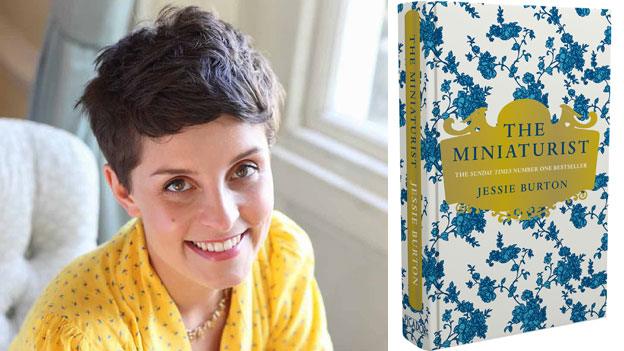Jessie Burton: I never thought of The Miniaturist as ambitious
- Published

Jessie Burton's book was the subject of a publishing bidding war in April 2013 at the London Book Fair
Jessie Burton's novel The Miniaturist, a "literary thriller" set in 17th Century Amsterdam, is one of the publishing success stories of the year.
Since it came out in July 2014, it has become the best-selling literary debut hardback of the decade. This week it was named Waterstones Book of the Year and Burton won the new writer of the year prize at the National Book Awards last week.
Set in 1686, The Miniaturist tells the story of a young bride, Nella Oortman, who is given a miniature replica of her own house whose contents seem to mirror real life.
Burton, 31, wrote the book over four years while working as an actress and as a PA in a City firm. She tells the BBC's Tim Masters how she got the idea on holiday in Amsterdam, and about her next book.
In your blog you say you wrote The Miniaturist with "a love that bordered hate" and it made you "cry with frustration". How hard a book was it to write?
When you are an unpublished writer and you don't have an agent it is a world of doubt whether this work will ever see the light of day. The reason I sometimes hated it was because I could see it in my mind's eye but I couldn't necessarily make it manifest on the page.
People have described it as an ambitious book. I never thought of it as that. There were a lot of plot strands to balance - it takes a very long time to make a book readable for the general public and that was my struggle.
And you wrote some of it while temping in the City?
I was doing it to the fill the gaps in between acting. I always made sure I did my other work but I did have to write it in bits because I had to pay the bills.
You were inspired by Petronella Oortman's dollhouse in the Rijksmuseum - was it a lightning bolt moment?
I was very fascinated by this house and I stood in front of it for a lot longer than anybody else. The things that caught my attention was the fact that she spent as much money on it as her real house. I thought: "Why?"
How scrupulous was your research?
The society of the time was one of great ostentation. In a wealthy society like that they were painting themselves and decorating their houses - there was a lot of evidence left for me to look at. There are so many paintings and first-hand accounts. There's a cookbook I used from 1671.
But I didn't want it to be a didactic history lesson for the reader. I wanted it to be a story with characters who you cared about.
Why do you think the character of Nella has had such appeal to readers?
Nella is so spirited and she takes life by the horns and gets on with it. She's a life force and I think people are attracted to that.
You're a trained actor - will this story have any life on the stage?
It would be great if it was adapted into a play. It would be a good Christmas extravaganza - maybe a musical. Maybe I should write a libretto.
Do you miss acting?
I don't think it ever quite leaves you but one of the reasons this book came into being was because the acting was drying up - as it does for quite a few women in their late 20s. The publishing industry has welcomed me with open arms far more than the acting industry ever did.
What stage are you at with your next novel?
It's called Belonging. I'm about a quarter of the way through a first draft. I've got the whole book plotted out.
It's a dual time frame that starts in the Spanish Civil War. A promising artist goes missing - presumed dead - and then 30 years later in a London art gallery his works re-emerge. This opens a can of worms for the woman working in the gallery who's been trying to keep secrets.
It's a thriller with romance and art in the mix. I'm having fun with it.
- Published1 December 2014
